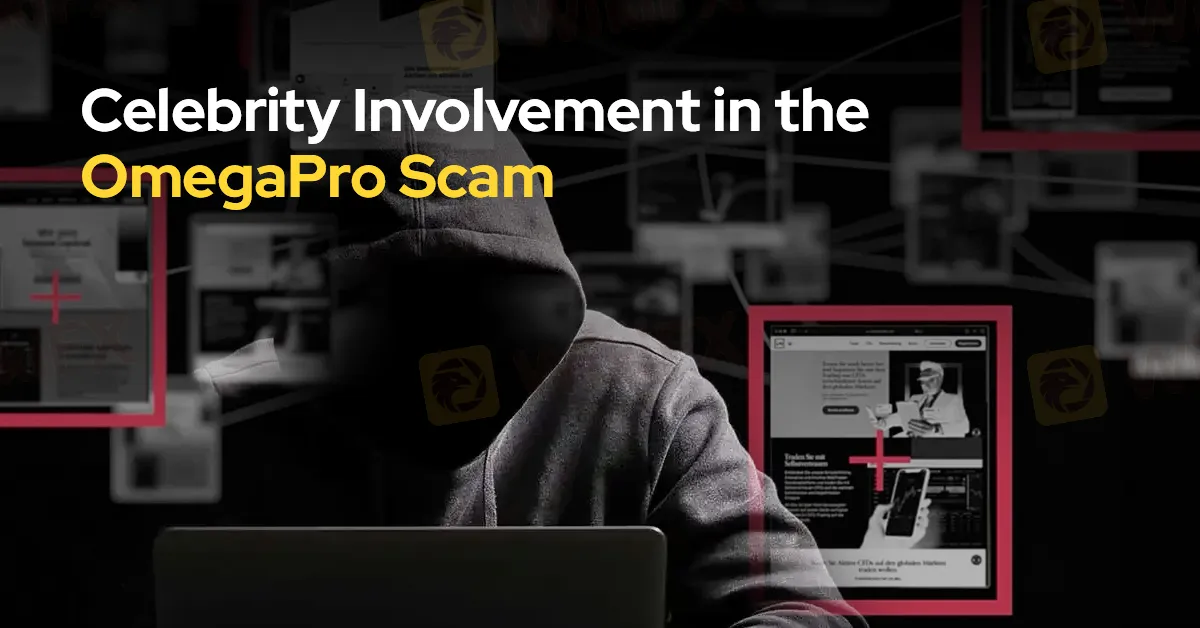简体中文
繁體中文
English
Pусский
日本語
ภาษาไทย
Tiếng Việt
Bahasa Indonesia
Español
हिन्दी
Filippiiniläinen
Français
Deutsch
Português
Türkçe
한국어
العربية
Celebrity Involvement in the OmegaPro Scam: Football Stars and Hollywood Icons Entangled
Abstract:The OmegaPro scam, one of the most extensive financial frauds in recent history, has implicated not only its founders but also several high-profile celebrities, including renowned football players and Hollywood stars.

The OmegaPro scam, one of the most extensive financial frauds in recent history, has implicated not only its founders but also several high-profile celebrities, including renowned football players and Hollywood stars. These public figures, knowingly or unknowingly, lent their names and influence to a pyramid scheme that defrauded over three million people worldwide, with significant impacts in countries like Portugal.
Football Legends in the Spotlight
Among the most prominent names associated with the OmegaPro scam are former football superstars Luís Figo, Iker Casillas, and Ronaldinho Gaúcho. These athletes, celebrated for their achievements on the field, were used as promotional figures by OmegaPro, adding an illusion of credibility to the fraudulent scheme. Their involvement, whether through endorsements or participation in events, played a crucial role in attracting a vast number of investors to the scam.
In Portugal alone, at least 156 victims have been identified, according to a lawyer representing them. However, despite the significant number of people affected, none of the victims have filed formal complaints with police or judicial authorities, reflecting a broader issue of underreporting in cases of financial fraud.
Hollywood Stars and the World of Cryptocurrency
The scandal also extends beyond the world of sports. Hollywood actor Steven Seagal, known for his action-packed movies, was another high-profile figure linked to OmegaPro. Seagal, like the football stars, was involved in promoting the scheme, which promised unrealistically high returns through supposed cryptocurrency investments.
The inclusion of such celebrities in the promotion of OmegaPro highlights a disturbing trend where public figures are used to legitimize fraudulent schemes. Their influence, particularly on social media, has the potential to sway the opinions and decisions of millions of fans and followers, many of whom may not be well-versed in the complexities of financial investments.
The Impact and Legal Challenges
The involvement of these celebrities has not only amplified the scale of the OmegaPro scam but also complicated the legal landscape. Victims, many of whom were enticed by the endorsements of their favorite stars, now face the harsh reality of having lost their investments with little hope of recovery. The reluctance to come forward and report these crimes is a significant barrier to justice, as seen in the case of the 156 Portuguese victims who have yet to file complaints.
This case underscores the need for greater scrutiny of celebrity endorsements in financial products, particularly in the rapidly evolving world of cryptocurrencies. While some celebrities may be unaware of the fraudulent nature of the schemes they promote, others may be more complicit, blurring the lines of responsibility.
Moving Forward
As legal proceedings continue against OmegaPro and its founders, the role of these celebrities in the scam is likely to come under greater scrutiny. The arrest of Andreas Szakacs in Turkey marks a critical step in dismantling the fraudulent operation, but the global nature of the scam and the involvement of high-profile figures make this a complex case with far-reaching implications.
For the victims, the road to recovery is long and uncertain. However, the exposure of such scams and the involvement of public figures can serve as a powerful reminder of the importance of due diligence and skepticism, even when faced with the allure of celebrity endorsements. As the legal battle unfolds, it may also prompt more stringent regulations around celebrity involvement in financial promotions, aiming to protect consumers from falling prey to similar schemes in the future.

Disclaimer:
The views in this article only represent the author's personal views, and do not constitute investment advice on this platform. This platform does not guarantee the accuracy, completeness and timeliness of the information in the article, and will not be liable for any loss caused by the use of or reliance on the information in the article.
Read more

Forex Brokers vs. Crypto Exchanges: Which Is Safer for Traders?
The world of trading offers two major platforms: forex brokers and cryptocurrency exchanges. Both provide opportunities, but they also come with risks. Traders often wonder which is the safer option. While some lean towards traditional forex brokers, others trust the decentralised nature of crypto exchanges. Let us know if you are #TeamForex or #TeamCrypto!

XTB Secures UAE and Indonesia Licenses, Expands in 2025
XTB accelerates global growth in 2025 by securing key licenses in the UAE and Indonesia, paving the way for broader services and innovative offerings worldwide.

CFTC Orders Mosaic to Pay Over $1 Million for Fraudulent Crypto Scheme
The U.S. Commodity Futures Trading Commission (CFTC) has recently filed a significant lawsuit against Mosaic Exchange Limited and its CEO, Sean Michael, alleging a fraudulent digital asset commodity scheme that occurred between February 2019 and June 2021.

Housewives Scammed of Over RM1 Million in Gold Investment Fraud
A fraudulent gold investment scheme has caused significant financial losses for 44 individuals, predominantly housewives, in Kelantan, Malaysia. The victims, collectively, have lost over RM1 million to the scheme, according to the Malaysia International Humanitarian Organisation (MHO).
WikiFX Broker
Latest News
Wolf Capital Exposed: The $9.4M Crypto Ponzi Scheme that Lured Thousands with False Promises
Confirmed! US December non-farm payroll exceeded expectations
Spain plans 100% tax for homes bought by non-EU residents
90 Days, Rs.1800 Cr. Saved! MHA Reveals
The Yuan’s Struggle: How China Plans to Protect Its Economy
LiteForex Celebrates Its 20th Anniversary with a $1,000,000 Challenge
Misleading Bond Sales Practices: BMO Capital Markets Fined Again by SEC
Italy’s Largest Bank Intesa Sanpaolo Enters Cryptocurrency Market
400 Foreign Nationals Arrested in Crypto Scam Raid in Manila
Singapore Blocks Polymarket Access, Following U.S. and France
Currency Calculator






